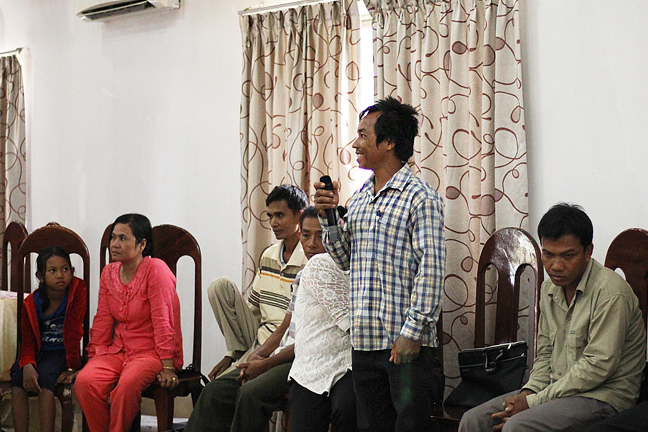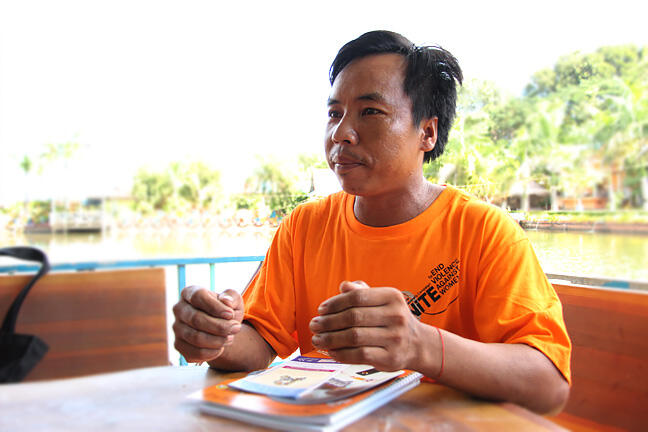sKampong Cham, 27 November 2016 - In his orange T-shirt, which reads “UNiTE to END VIOLENCE AGAINST WOMEN”, Seng Bunthim along with many others joined the recent 16 Days Campaign event in Prey Chhor district, organized by the Ministry of Women Affairs and UNFPA Cambodia.
The 31-year-old man from Samraong commune, Kampong Cham province has been working as a community facilitator for primary intervention in violence against women and girls for the past three months.
UNFPA caught up with Bunthim during the campaign and interviewed him about his journey and motivations in working to end violence against women and girls.
Fostering happy and healthy relationships in family
“I organize community sessions to teach about 30 adolescents about happy and healthy relationships. I do that two times a month with another community facilitator. We work as a team,” Bunthim explained.

In May 2016, Bunthim along with other 30 community facilitators received training from UNFPA on how to effectively organize workshops on the prevention of violence against women and girls for adolescents and caregivers.
Bunthim’s workshops aim to both make young people understand different forms of violence, and know how to seek help if exposed to violence themselves. The sessions also guide adolescents on how to respond to changes in their lives when growing up, gender and power relations and healthy relationships in dating and within the family.
Since childhood experiences of abuse are strongly associated with men’s perpetration of violence, breaking the cycle of violence should therefore begin with positive relationships between adolescents and their parents or caregivers.
“I think parents will have closer relations with their children if they do not use violence. I myself used to resort to violence. I hit my daughter once when she was 7 years old. That left a scar on my heart until now,” said Bunthim who still remembers the scene vividly.
“She cried and asked me why I hit her. I told her I hit her because she did not work hard on her study, but then she kept crying even more and it made me cry too.”
Bunthim said even though he was only aiming to benefit his daughter by making her study harder, that simply did not justify using violence against her .
“There are many other ways to deal with the problem and violence should not be one.”
“Ever since that incident, I felt very guilty and decided to never use force on my daughter again. My relationship with her has become closer after I stopped; now she also does great in school.”
Now through his community sessions, Bunthim, along with other facilitators, works to promote positive relationships between children and parents/caregivers without using violence in their community.
“I am not related to them, but I can relate to their pain”
Though Bunthim’s focus group is on adolescents, it does not stop him from going beyond his work. When there is domestic violence in his village, he usually intervenes by calming both parties down and explaining them that there are alternatives to violence.
Even though domestic violence in Cambodia is often considered as a “family issue” which should not be interfered with by outsiders, this does not deter him. “I am not related to them, but I can relate to their pain,” Bunthim explained.
Bunthim thinks the cause of violence in his community is mainly due to alcohol consumption. “It’s usually the case that the husband comes home drunk and beats his wife and children, and it's always the same person.”
When asked about his hopes forthe future, Bunthim replied, “I want to strengthen my skills as a community facilitator so that I can change people’s mindsets towards violence against women and girls.”
“I hope more and more people are sensitized to the issue especially men and boys.”
In May 2016, Bunthim along with other 30 community facilitators received training from UNFPA on how to effectively organize workshops on the prevention of violence against women and girls for adolescents and caregivers.
Bunthim’s workshops aim to both make young people understand different forms of violence, and know how to seek help if exposed to violence themselves. The sessions also guide adolescents on how to respond to changes in their lives when growing up, gender and power relations and healthy relationships in dating and within the family.
Since childhood experiences of abuse are strongly associated with men’s perpetration of violence, breaking the cycle of violence should therefore begin with positive relationships between adolescents and their parents or caregivers.
“I think parents will have closer relations with their children if they do not use violence. I myself used to resort to violence. I hit my daughter once when she was 7 years old. That left a scar on my heart until now,” said Bunthim who still remembers the scene vividly.
“She cried and asked me why I hit her. I told her I hit her because she did not work hard on her study, but then she kept crying even more and it made me cry too.”
Bunthim said even though he was only aiming to benefit his daughter by making her study harder, that simply did not justify using violence against her .
“There are many other ways to deal with the problem and violence should not be one.”
“Ever since that incident, I felt very guilty and decided to never use force on my daughter again. My relationship with her has become closer after I stopped; now she also does great in school.”
Now through his community sessions, Bunthim, along with other facilitators, works to promote positive relationships between children and parents/caregivers without using violence in their community.
“I am not related to them, but I can relate to their pain”
Though Bunthim’s focus group is on adolescents, it does not stop him from going beyond his work. When there is domestic violence in his village, he usually intervenes by calming both parties down and explaining them that there are alternatives to violence.
Even though domestic violence in Cambodia is often considered as a “family issue” which should not be interfered with by outsiders, this does not deter him. “I am not related to them, but I can relate to their pain,” Bunthim exlained.
Bunthim thinks the cause of violence in his community is mainly due to alcohol consumption. “It’s usually the case that the husband comes home drunk and beats his wife and children, and it's always the same person.”
When asked about his hopes forthe future, Bunthim replied, “I want to strengthen my skills as a community facilitator so that I can change people’s mindsets towards violence against women and girls.”
“I hope more and more people are sensitized to the issue especially men and boys.”


